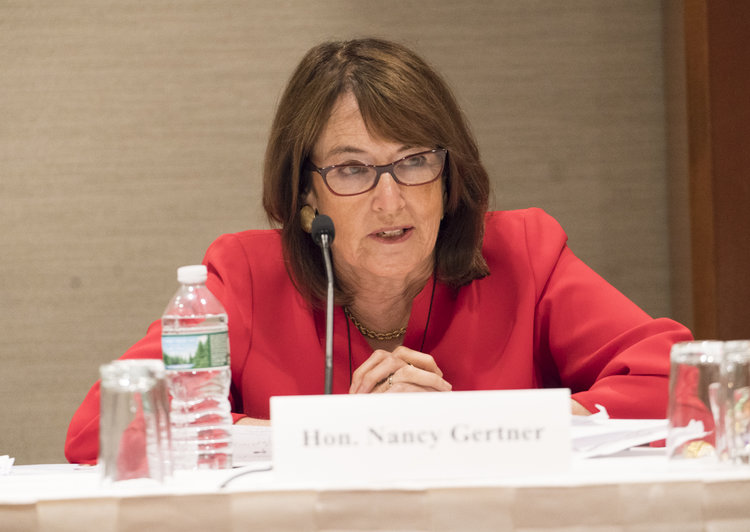ABA Journal
Annual Meeting
August 13, 2017
By Debra Cassens Weiss

Retired U.S. District Judge Nancy Gertner. Photos by Len Irish.
Civil rights advocates who are worried about the outcome of pending blockbuster cases before the U.S. Supreme Court can take heart.
If rights continue to be diluted by court decisions, “eventually, you get to a bridge too far,” says retired U.S. District Judge Nancy Gertner.
That happens when there is an aberrant case where the rights violation is so egregious that the justices “stick their toe in” and impose limits on the erosion of rights, said Gertner, who spoke at an ABA Annual Meeting program on Saturday called “Advancing Civil Rights and Social Justice in the New Supreme Court.”
As an example, Gertner cited the case of Duane Buck, who was convicted and sentenced to death in Texas after his own expert testified on cross-examination that he is statistically more likely to be dangerous in the future because he is black. The finding of future dangerousness was needed for a death sentence in the state. In a February decision, the U.S. Supreme Court said Buck’s lawyer had been ineffective, and he could reopen the judgment.
The Buck case, Gertner said, was “a bridge too far” for the justices.
Gertner noted that new Supreme Court Justice Neil Gorsuch will likely bring a different perspective to criminal cases than the justice he replaced, the late Antonin Scalia, who gave a literal interpretation to the Bill of Rights. Scalia was concerned about unreasonable searches and violations of the confrontation clause, while Gorsuch’s appellate opinions haven’t reflected that type of originalism, she said.
Panelists considered several important cases before the U.S. Supreme Court this term involving issues such as partisan gerrymandering, a baker’s refusal to supply a cake for a gay couple’s wedding, a purge of Ohio voters, police collection of cellphone data without a warrant and President Donald Trump’s travel ban.
The prior term was the calm before the storm, said panel moderator Caroline Fredrickson, who gave credit to New York Times reporter Adam Liptak for the description. With eight members for most of the term, the court avoided tough cases, remanded others and used narrow grounds to reach decisions. Gorsuch has so far given some indications that he will take extremely conservative positions as he participates in a full term of the court, said Fredrickson, president of the American Constitution Society.

American Constitution Society President Caroline Fredrickson
Also speaking on the panel were Debo Adegbile, a partner at WilmerHale who is a commissioner with the U.S. Commission on Civil Rights; and Marc Elias, a partner and chair of the political law practice at Perkins Coie, who was general counsel for Hillary Clinton’s campaign.
Though the Supreme Court has already accepted some voting rights cases this term, Elias said he believes there will be more. “The bad news from my perspective—as the resident partisan on the panel—is that these cases will come up with a less-friendly Supreme Court to voting rights,” he said.
Panelists also expressed concern about the case involving a Christian bakery owner who refused to make a wedding cake for a gay couple. The issue is whether a Colorado nondiscrimination law violated the constitutional rights of the owner of the bakery, the Masterpiece Cakeshop.
The case “threatens to fundamentally undermine Title VII,” Gertner said, because a ruling for the baker could support future claims that religious beliefs allow business owners to discriminate against minorities or other protected classes.

Marc E. Elias, partner and chair of the political law practice at Perkins Coie.
Adegbile pointed to a prior concurrence by Gorsuch in the Hobby Lobby case when he was a federal appeals judge that suggests he could support religious rights over nondiscrimination. The case involved a challenge to the contraceptive mandate in the Affordable Care Act by a closely held corporation.
Gorsuch wrote in his opinion (PDF): “All of us must answer for ourselves whether and to what degree we are willing to be involved in the wrongdoing of others. For some, religion provides an essential source of guidance both about what constitutes wrongful conduct and the degree to which those who assist others in committing wrongful conduct themselves bear moral culpability.”

Debo Adegbile, a partner at WilmerHale who is a commissioner with the U.S. Commission on Civil Rights.
http://www.abajournal.com/news/article/will_the_supreme_court_get_to_a_bridge_too_far_in_big_cases_next_term

